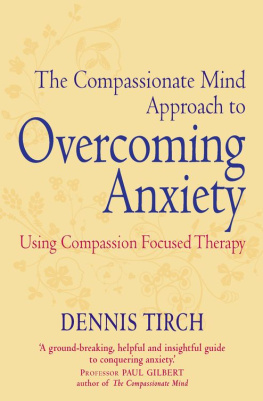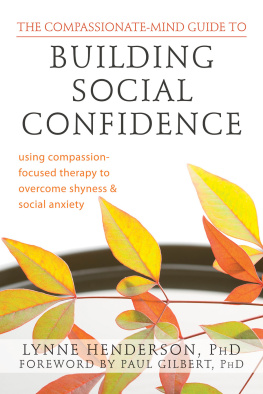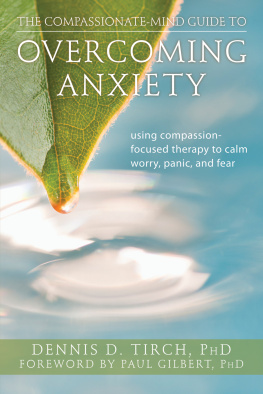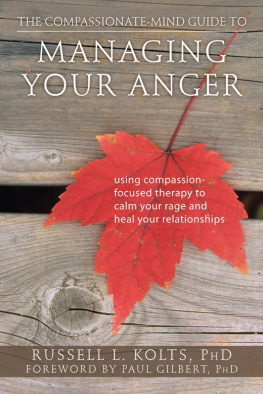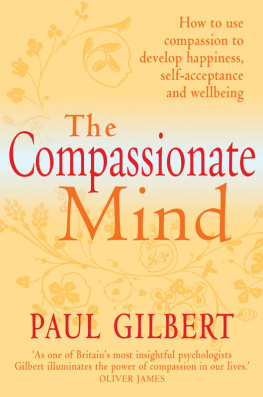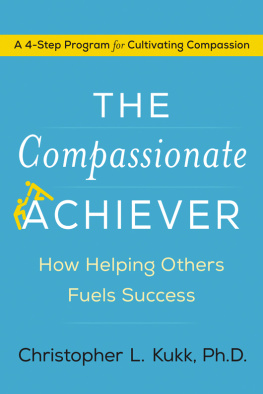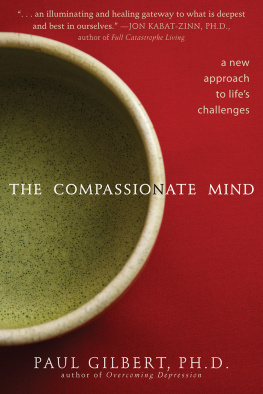I dedicate this book to my teachers and parents, all of you, and to future generations.
This book would not have been possible without my teachers, both Eastern and Western. Particularly, I am indebted to His Holiness the Fourteenth Dalai Lama, who took time from his busy schedule to write the foreword. He is an inspiration for me and for millions around the world, and a living example of compassionate insight. With the help of two friends, John Cerullo and Geshe Dhargye, I was able to bring this book to the attention of Geshe Ngawang Sonam, who serves in the office of His Holiness the Dalai Lama. Geshe Ngawang Sonam took the time to read the book, offer helpful suggestions, and present it to His Holiness. His Holinesss foreword speaks directly to the need for secularized approaches to self-regulation and compassion development. His clear and eloquent message promotes basic human values of tolerance, kindness, and peace. I also am indebted to my many teachers, especially Gyumed Khensur Losang Jampa Rinpoche and Sermey Khensur Lobsang Tharchin Rinpoche, who kindly instructed me over the past 40 years in the vast and profound teachings of the Tibetan mind training tradition. It is their guidance and example that led me to write this book.
There are so many to whom I feel gratitude. I am grateful to my wife, Sharon, who has patiently stayed by my side as I have worked on this. Several friends offered support through being advance readers, including Dr. Lorne Ladner, Peter J. Delany, PhD, Dr. Michael Sanger, Dr. Carly Hunt, Eric Treider, Ingrid Czintos, and Maureen Sullivan. Thomas Pruzinsky, PhD, helped me develop the initial model for the COMPASS approach to compassion training and wrote a brief passage for the introduction to this book about empirical validation of other similar compassion training programs. Jeremy Lehrer read early sections of the book and made helpful suggestions. Several other friends also contributed to sections of the book, including Dr. John Tedeschi, Dr. Lorne Ladner, Peggy DiVincenzo, LPC, LMFT, Erika Neil, LCSW, JD, Kimberly Hoskins, PsyD, and Eric Propst, PsyD. I am indebted to Thomas Pruzinsky, PhD, Rachael D. Goodman, PhD, and Dr. Carly Hunt for designing and implementing three formal pilot studies of COMPASS and to Dr. Clara Hill and Alex Hilert, who offered their expertise. I am also grateful to those who participated in the pilots, to my students who have tried the exercises, and to everyone who has given me feedback and encouragement over the years. Also, I am indebted to John Cerullo, Mark Kerr, Courtney Packard, Jehanne Schweitzer, Jo-Ann Parks, and everyone at the Rowman & Littlefield Publishing Group for bringing this work to fruition.
Without the pioneering efforts of mindfulness practitioners such as Jon Kabat-Zinn, Sharon Salzberg, Jack Kornfield, Tara Brach, Kristen Neff, Christopher Germer, and many others, much of the material in the section on the foundational mindfulness practices of COMPASS would not be available. Without Tibetan and Western scholars of Tibetan Buddhism such as Thubten Jinpa, Professor Robert Thurman, Artemus Engle, and many others, we would not have access to the rich treasury of Tibetan literature. I also want to acknowledge Dr. Lorne Ladner for his pioneering work in bringing a Western psychological perspective to the Tibetan mind training tradition in his book The Lost Art of Compassion. This, together with the efforts of many Western and Tibetan scholars, writers, and researchers has led to a blossoming in empirically validated compassion training approaches, most notably Cognitively Based Compassion Training and Compassion Cultivation Training. I am also indebted to the work of Dr. Charles Figley and others who have written extensively on compassion fatigue, its causes, ways to assess it, and ways to prevent and treat it. I am grateful to all of you and delighted that the life-giving tradition of Tibetan mind training is becoming more widely understood and used around the world.
I n this handbook you will find a detailed discussion of the brief tips for helping professionals found in the text boxes interspersed throughout the book. At the end of this handbook is a section that contains all the main exercises set forth in the COMPASS approach to developing resilient compassion. It is hoped that the handbook will provide an easy-to-use reference for helping professionals seeking to prevent or recover from compassion fatigue and hoping to renew and strengthen their compassion insight.
The sections are as follows:
- Empathy and Compassion
- Compassion Fatigue
- Regaining Equilibrium
- Finding Acceptance and Self-Compassion When Something Goes Wrong
- Cultivating Self-Care and Healthy Professional Boundaries
- The Benefits of Compassion in the Workplace
- Focusing on Strengths and Solutions When Working with Addictions
- Equanimity and Honoring Diversity
- Filling Your Cup with Gratitude When Taking Care of Others
- Maintaining Patience and Kindness When Confronted by Workplace Bullying
- Choosing Compassion as Your Moral Compass
- Staying Compassionately Engaged in Challenging Client Situations with Giving and Taking
- Maintaining Self-Care and Active Compassion in Crisis and Disaster Situations
- Finding Hardiness in Your Compassion and in Your Sense of Mission
- Weeding Out Self-Defeating Thoughts
- Assisting Clients with End-of-Life Issues and Coping with Our Own Mortality
- The Core COMPASS Practices in Simple Form
Section 1. Empathy and Compassion
Empathy and compassion are crucial elements of the helping process. For example, the majority of studies on positive therapeutic outcomes indicate that the relationship between a therapist and client is a primary factor in the healing process, and that this alliance is strengthened by the therapists ability to be empathic, helpful, and understanding. Empathy is the ability to recognize what another person is going through and compassion is the wish that the person be free from suffering and difficulty.
Psychologists describe two types of empathy: cognitive and emotional.
Researchers have begun to map the parts of our brain that engage when we tap into empathy and compassion.
These empathically engaged neural circuits compete with vigilance-to-threat networks like the amygdala and can easily be dominated should fear and distress steal our focus away,
Compassion is crucial for well-being and effectiveness in the helping professions. For instance, teachers with a compassionate approach to teaching create classroom environments with increased cooperation and enhanced learning in their students.
All helping professions consider empathy and compassion to be a crucial part of their respective callings. For instance, according to Supervisory Special Agent William Beersdorf of the FBI, Having compassion and empathy for fellow human beings is essential for successful law enforcement personnel. Without empathy and compassion, helping professionals can become uncaring or even inept and harmful. Therefore, teachers, childcare providers, nurses, military personnel, civil servants, employers, doctors, service industry personnel, therapists, social workers, and front-line workers from almost every aspect of our society must rely on empathy and compassion as core motivators for providing competent services to the public.
The exercises set forth in the COMPASS approach are designed to establish equilibrium and self-care, evoke emotional states conducive to compassion, strengthen compassion resilience, and reduce obstacles to maintaining a compassionate heart. It is hoped that they will provide a useful tool in strengthening helper dedication, performance, and well-being.
Section 2. Compassion Fatigue



